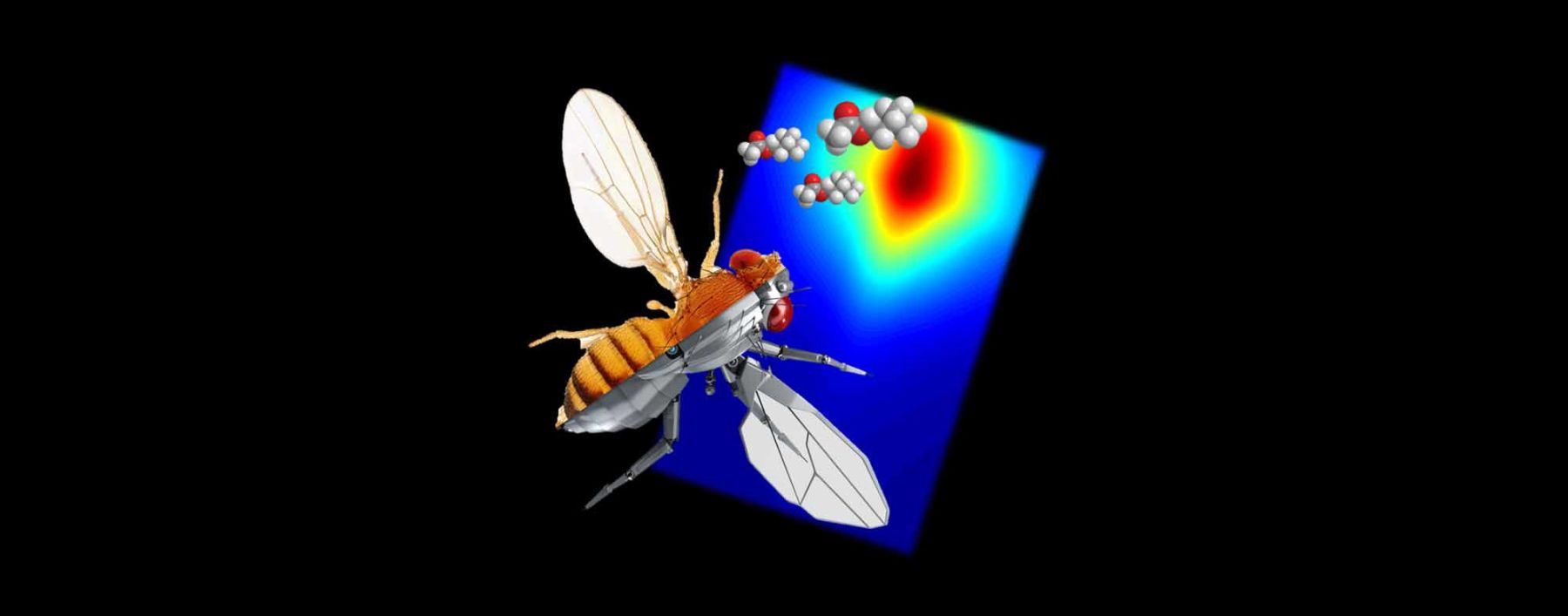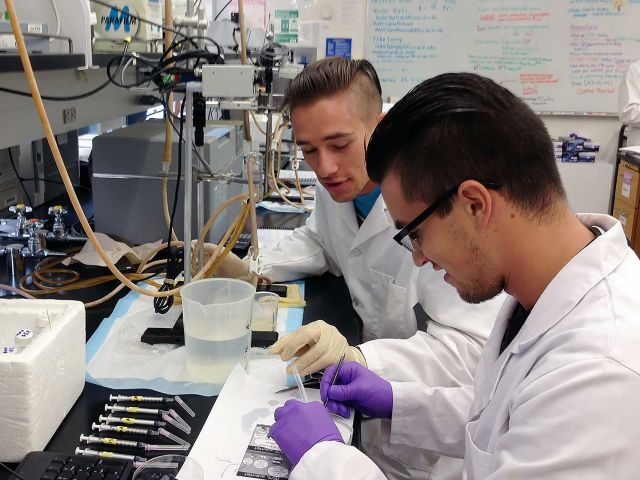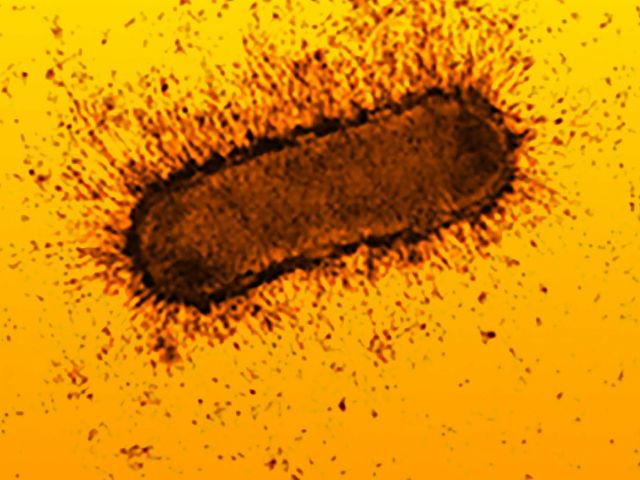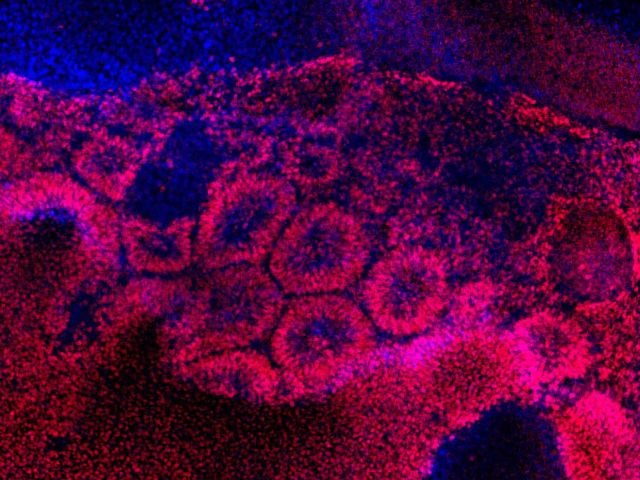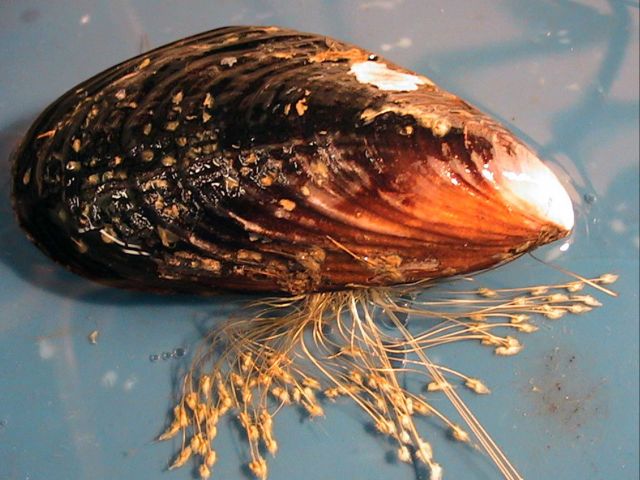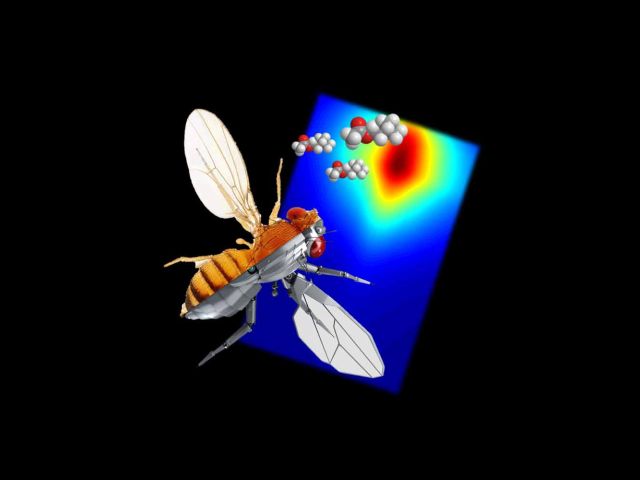Modern molecular and cellular biology brings together a diverse group of disciplines and technologies with the common goals of understanding how biomolecules are synthesized, interact, and function, and are further organized into cells and specialized tissues that enable organismal function. Some molecular and cellular biologists concentrate on the role that one particular molecule plays within cells, while others study the way in which molecules assemble into structures such as chromosomes or nuclei. Still others examine how groups of cells interact to form systems of greater complexity. The range of instruments and methods employed by molecular and cellular biologists is equally diverse and includes recombinant DNA technology, biochemistry, cell culture, genetics, and light, fluorescence, and electron microscopy.
The Major
The B.S. in Molecular and Cellular Biology (MCB) enables students to focus on specialized topics underpinning the molecular biological world while also providing flexibility to design unique curricular pathways based on individual interests. Students in the MCB major take courses fulfilling requirements in several specialized areas investigating scales of biology ranging from biomolecules to cells and organized, specialized tissues or entire organisms. The MCB major fills a niche for students who want more molecular specialization than offered by the general Biological Sciences majors while also allowing a greater number of molecular and cellular biology electives.
The Molecular and Cellular Biology B.S. degree can be completed with a wide breadth of biology coursework; however, students who are interested in specialization may focus further by pursuing any of the four emphases housed within the MCB major: biochemistry and molecular biology, microbiology, cell and developmental biology, and pharmacology.
Major Timeline
The B.S. in Molecular and Cell Biology (MCB) is the new, specialized MCDB-specific major that will be available for students to declare in Fall 2024 in lieu of the four specialized MCDB majors. Qualified continuing students may submit the major change petition paperwork in Summer 2024, effective for Fall 2024.
Q and A about the MCB Major
- Question: I've declared my B.S. in another biology major, can I switch to the new MCB major?
-
Answer: Yes! Please go to this link for instructions and paperwork on changing your major: https://undergrad.biology.ucsb.edu/current
- Question: I originally came to UCSB to study one of the four specialized MCDB majors (Pharmacology, Microbiology, Cell and Developmental Biology, Molecular Biology and Biochemistry), can I still complete one of those degrees?
-
Answer: Yes, if you are entering your third year of study in the 2024/2025 academic year, or your fourth year of study in the 2025/2026 academic year you can complete one of the aforementioned majors using the 2023/2024 major sheet as the curricular document.
- Question: I'm currently a first or second year premajor, will I be able to specialize within the new MCB major?
-
Answer: Yes, the MCB major includes emphases that are suggested curricular paths; however, we think most students will enjoy the flexibility of the MCB major alone.
- Question: What is the difference between an emphasis and a major?
-
Answer: Majors have more rigid curricular requirements, while emphases are noted on your transcripts under the MCB major. Emphases are curricular suggestions that provide direction to students who seek more specialized training in certain biology disciplines. They provide students with greater course flexibility, enabling students to uniquely tailor their training to their specific interests.
Careers in Molecular and Cellular Biology
The Molecular and Cellular Biology major is excellent preparation for graduate study leading to the Master's and Ph.D. degrees in most of the biological sciences. Given the breadth of the MCB major, students gain entry into graduate programs in major universities without needing to make up deficits in either course work or understanding.
Students interested in research careers can take advantage of the department's many exciting laboratory experiences in areas such as recombinant DNA, immunology, cell biology, developmental biology, pharmacology and medical microbiology. The flexibility of the MCB major enables individuals to complete multiple MCDB course-based laboratories that help students prepare for a variety of laboratory-related positions with major universities, government research institutions, and private firms which specialize in all aspects of molecular biology and cellular biology.
The MCB major is also excellent preparation for medical, dental, pharmacy, or veterinary schools where an understanding of biology at the molecular and cellular level is fundamental. Students interested in the health sciences and related professions can take advantage of the University's excellent health science advisory system located in Cheadle and North Halls. They can seek advice and support from the beginning of their studies in biology to their entrance into health sciences graduate programs and professional schools.
Students interested in teaching biological sciences or conducting research at the university should plan to complete a Ph.D. degree. Students interested in teaching at the community college level should pursue graduate work at least through the master's degree. Teaching at the junior high or high school (secondary) level requires the California single subject teaching credential. Students considering this last option should discuss their plans with the credential advisor in UCSB's Graduate School of Education early in their academic careers.
High School Preparation
Recommended as part of or in addition to the UC admission requirements:
-
One year of biology
-
One year of chemistry
-
Mathematics through trigonometry
-
One year of physics
Transfer Preparation
For admission to the major, complete the following courses with a cumulative GPA of at least 2.7 prior to transferring to UCSB:
- One year sequence of general chemistry with laboratory
- A complete sequence of major-applicable general biology with laboratory
- Two terms of calculus and either a third term of calculus or one term of statistics
- One year sequence of organic chemistry with laboratory
- One year sequence of physics with laboratory (strongly recommended)
Please see ASSIST.ORG, the UCSB General Catalog, or your high school or community college counselor for more information on course preparation.
FAQs
- How many upper division biology courses should I take per quarter?
-
We recommend taking two upper division biology courses per quarter (assuming 8.0 units per quarter) and, if possible, fulfilling area specific requirements first starting one's Junior/3rd year. This will give you the required 48.0 units required for most of our majors. For more detailed recommendations for the MCDB majors please go to: Resource Documents: Recommended Schedule - MCDB majors.
